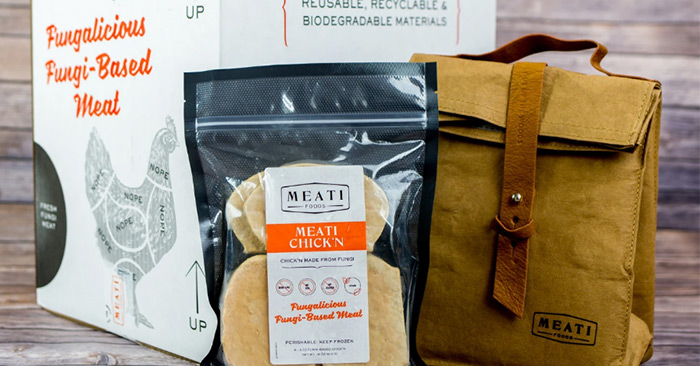Meati Raises $28M in Series A Round to Scale Production of Fungi-Based Meat

Meat alternative startup Meati announced last week the close of a $28 million Series A round of funding, which the Colorado-based company will use to scale production of its fungi-based chicken and steak cuts. The goal, Meati CEO and co-founder Tyler Huggins said, is to reach price parity with traditional meats before a launch into retail and food service.
The round was led by Acre Venture Partners, and also included a mix of new and previous seed round investors, such as Prelude Ventures, Congruent Ventures and Tao Capital. Once Upon A Farm CEO John Foraker and Sweetgreen co-founders Nicolas Jammet and Jonathan Neman also participated in the round.
The new funding follows a $4.8 million seed round in July 2019, which Huggins said was used to develop a pilot system and demonstrate the scalability of production of its meat alternative. Meati’s chicken and beef alternatives use mycelium, fermented fungi that have a fibrous structure mimicking the texture of animal muscles, as their core ingredient. The company produces the mycelium itself, using fermentation tanks and a process similar to beer brewing. The end product uses less land, water and energy than many other alternative protein sources such as soy or pea, Huggins said.
The company’s next phase will build out capacity through the construction of a new production facility to prepare for launches into retail and food service.
“We’re not just going out into the market, buying commodity crops, reformulating it, putting a different sticker on it and sending it out,” Huggins said. “We’re actually creating a whole new system that we believe is sustainable, providing high nutrition that’s affordable to everybody. We feel like this is a divergence from what’s currently out on the market.”
Meati’s unique and sustainable production process has proved to be a selling point for investors. Lucas Mann, managing partner at Acre, said in a press release that the firm “for years” had been looking for “alternative meat that is as nutritious as it is sustainable.”
Meati’s “truly innovative and disruptive” product also led Boulder Food Group, investor in brands such as Caulipower, Bobo’s and Barnana, to make its first investment into the plant-based meat sector, noted partner Ben Fenton. He said the firm was particularly attracted to the intellectual property defensibility of the company’s proprietary production process, which allows Meati to efficiently produce meat alternatives at a competitive price point. While other competitors have said the goal is to eventually produce meat alternatives at the same price as their animal-based counterparts, that has largely remained an elusive achievement.
“[Meati has] identified a path to get this [price] down further and are at a point, faster than most, where they have a commercially viable product from a price and production standpoint whereas many other players in the space remain many months, if not years out,” Fenton said.

Though most meat alternatives have focused on retail or foodservice to enter the market, Meati aims to be a “significant player” in both channels, Huggins said, though it is still working to determine which of its products — its chick’n or steak cuts — will launch in which channel. Meati had a beta launch of its steak product in June, releasing a “Banh Meati Sandwich” using its fungi-based steak cuts at Boulder, Colorado’s SALT Bistro. The test had positive reception from consumers, Huggins said, and the company plans to do additional small food service test launches in the near future, as well as potentially launch a direct-to-consumer platform.
While its supply is still limited, Meati is working to still find new ways to build consumer interest. Currently the company is hosting a raffle on its website, offering consumers the chance to enter to try a 6-pack of 3 oz. chick’n cuts. Given the “flexibility” of its production process, Huggins said, the company is able to quickly respond to feedback and adjust product attributes to fit consumers’ needs.
“We’re figuring out what is the best way to get the product out into people’s hands, get good feedback, and be able to deliver good quality in the process,” Huggins said.
As the company has ”a lot to do in the next 12 to 18 months,” Meati plans to make several new hires, adding food scientists and building out its marketing team. Last month, the company hired Tim Thomson, former director of strategic finance at Impossible Foods, as its VP of finance.
While the company does not have a set timeline for its products to launch, Huggins said “a lot will shake out” over the next few months, as the company ultimately aims to “get something that we think is valuable to people out into the market as fast as we can.”
“There’s no doubt the space is getting competitive, but the market is just enormous and I think there’s plenty of room for multiple different folks to play in this space,” he said. “We think we have something special, we think the market wants it. So we’ll move as fast as we can, while making sure that we do it in a good way.”

















